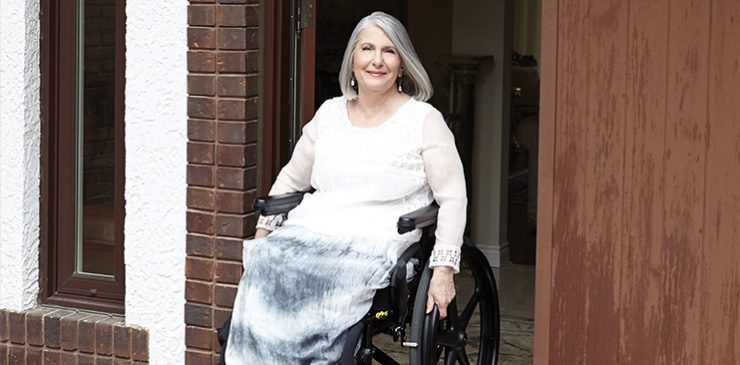Not because a pandemic has forced her and her friend to stay six feet apart. The visits stopped long ago, when she could no longer make it up the stairs of her neighbour’s house in her wheelchair. A step, a curb, a raised lip to a doorway; maybe six inches, possibly a foot high, but the barrier may as well be a brick wall she is facing. The result is the same, she can’t get past it so instead she watches from her window and remembers how inviting her friends home used to be.

Sandra Longo is used to seeing her mom observing life from behind her window instead of participating in it as she would like. Her mom sustained a spinal cord injury when Sandra was only eight years old. A complication with an epidural during childbirth meant Mary Longo’s life was forever changed, just as she was bringing a new life into it. Now a mother of four and facing life as a paraplegic. The injury impacted the whole family. Sandra and her siblings had to help her mother with household chores and looking after the baby. She also had to scout public places to look for hazards or barriers that her mother could not negotiate. She recalls going into stores to see if her mother’s chair would fit between the racks or going in through the kitchen of a restaurant because there was a step blocking her access to the front door. Sandra learned at a young age the barriers that our world has to full accessibility and inclusion. Over three decades later those barriers still exist.
Sandra’s lived experience of watching her mother struggle to overcome the barriers of inaccessible environments fueled her passion for making sustainable change for the population of wheelchair users. This passion is what led to the creation of the Navy Street Charity for Persons with Disabilities in 2016.
The mission of Navy Street Charity is to provide portable wheelchair ramps to individuals who live with disabilities that affect their mobility within Ontario. The title of the organization sprouts from the idea that city streets typically consist of black asphalt, however, someone in a wheelchair requires a slightly different path than the standard road we are accustomed to. The colour navy is a slight deviation from black and represents finding a slightly different path to achieve the same goal as the traditional pathway. The use of a portable ramp allows wheelchair users to overcome physical barriers in the environment such as curbsides and two-step stairs, thereby acting as a small solution to a big problem.
In addition to overcoming the physical barriers present throughout city streets and facilities, financial accessibility is also a major barrier to many wheelchair users. The cost of renovating a house to make it wheelchair-accessible can be incredibly expensive. Those that don’t have the means to own a home are restricted from making any alteration to the rental property. The efforts made by Navy Street Charity combats financial accessibility by donating the portable ramps to individuals in need free of charge.
Sandra pointed out her mother accepted her new normal of life with a wheelchair but has not come to grips with the limitations and social isolation associated with physical barriers and the lack of accessibility. Sandra compares the social isolation experienced by wheelchair users to the social isolation felt by many throughout the COVID-19 pandemic. The pandemic has taught everyone what it is like to be limited beyond their own control, which is exactly what wheelchair users experience daily. After the lengthy provincial lockdowns and stay-at-home orders, many people are looking forward to being able to connect and interact with others again. However, when the rest of the province emerges from the lockdowns, those who rely on mobility devices will continue to be excluded from some social gatherings due to the lack of accessibility.
 Sandra’s commitment to creating a more accessible world goes beyond the supply of ramps. She wants to change mindsets and is starting from the ground up with a new children’s book she authored. The book aims at helping children understand disability and the obstacles others face because of a lack of accessibility The book, titled “Our Night Sky” is “about a friend who wants to go and look at the stars in the sky, which is the one thing that connects everyone as we all have the same night sky no matter where we are in the world,” Sandra describes. The characters use a portable ramp to overcome physical barriers their friend faces which would typically obstruct her from enjoying the night sky and the socialization with friends. Sandra explained, “if I can help children look for obstacles, they are the architects of our future so we need the children to come up with better ideas to build a more inclusive society for individuals, in particular, those who use wheelchairs”. Accessibility is a big problem in our society and books such as “Our Night Sky” are designed to help young people understand the challenges people face when they live in a world that is not designed for their use.
Sandra’s commitment to creating a more accessible world goes beyond the supply of ramps. She wants to change mindsets and is starting from the ground up with a new children’s book she authored. The book aims at helping children understand disability and the obstacles others face because of a lack of accessibility The book, titled “Our Night Sky” is “about a friend who wants to go and look at the stars in the sky, which is the one thing that connects everyone as we all have the same night sky no matter where we are in the world,” Sandra describes. The characters use a portable ramp to overcome physical barriers their friend faces which would typically obstruct her from enjoying the night sky and the socialization with friends. Sandra explained, “if I can help children look for obstacles, they are the architects of our future so we need the children to come up with better ideas to build a more inclusive society for individuals, in particular, those who use wheelchairs”. Accessibility is a big problem in our society and books such as “Our Night Sky” are designed to help young people understand the challenges people face when they live in a world that is not designed for their use.
The efforts by Sandra Longo and the Navy Street Charity team have impacted hundreds of Ontario citizens. As of June 2021, Navy Street Charity has donated approximately 100 portable ramps to families and individuals in need. With the average cost of a portable wheelchair ramp costing upwards of $500, these contributions are significant and aid in making Ontario a more accessible and inclusive community. Additionally, the Navy Street Charity campaign also inspires many who have the financial means to make the purchase, however, they were originally unaware the product existed in the first place.
For the future on Navy Street Charity, Sandra hopes to expand Navy Street beyond Ontario across Canada, so everyone who leaves a rehab facility receives a donated portable wheelchair ramp. She also wants to work on making every beach in Ontario wheelchair accessible by donating Mobi-Mats to help people with mobility devices access beaches without the use of specialized equipment. Lastly, Sandra hopes to continue to inspire and educate children to help them understand the importance of inclusion despite differences as they will be tasked to continue to innovate and remodel current designs to include others and solve the problems regarding accessibility.
Navy Street Charity is a small organization with a huge heart looking to help as many members of the Ontario community as possible. For more information on Navy Street Charity for Persons with Disabilities, you can find them online at www.navystreet.org.






